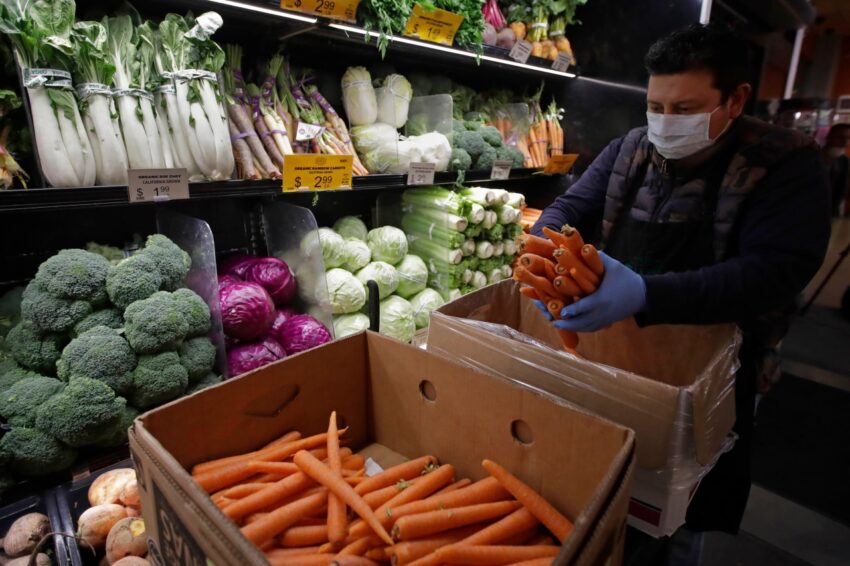WASHINGTON (AP) — A food aid program that helps more than 6 million low-income mothers and young children will run out of federal money within two weeks unless the government shutdown ends. Experts warn this could force states to use their own funds to keep it afloat or risk it shutting down entirely.
The $8 billion Special Supplemental Nutrition Program for Women, Infants, and Children, also known as WIC, provides vouchers for purchasing infant formula, fresh fruits and vegetables, low-fat milk, and other healthy staples often out of financial reach for low-income households.
The shutdown, which began Wednesday, coincided with the start of a new fiscal year. As a result, programs like WIC, which rely on annual federal funding, are nearly out of money. Currently, the program is being sustained by a $150 million contingency fund, but experts say it could be depleted quickly.
After the contingency fund runs dry, states could step in to pay for the program and seek reimbursement once a budget passes. However, not all states say they can afford to do so.
“We feel good about one to two weeks,” said Ali Hard, policy director for the National WIC Association. “After that, we are very worried.”
### WIC Helps Families Buy More Nutritious Food
Taylor Moyer, a mother of three from Virginia Beach, Virginia, has been receiving WIC benefits since her first son was born nine years ago. Recently separated from her husband, Moyer said the program allowed her to feed her children nutritious food that tends to be pricier than calorie-dense, processed options.
WIC also provided support when she struggled to breastfeed and offered counseling during her son’s picky eating phases.
“There’s been times where I have sat back in my house and really wondered how I was going to feed my family,” said Moyer, who works at the LGBT Life Center. “And I went to the store with my WIC card … I get rice, I got avocados, I got eggs, and I made a balanced meal that was actually good.”
### Political Deadlock Fuels Shutdown
The shutdown resulted from Democrats and Republicans failing to pass a new spending plan. Democratic lawmakers want to extend tax credits that make health care more affordable for millions of Americans and reverse deep cuts to Medicaid made earlier this year. They refused to approve any spending plan that did not include these provisions.
House Speaker Mike Johnson, a Republican from Louisiana, blamed Democrats for the shutdown and called them hypocritical, arguing that failing to fund the federal government endangers many health programs.
### Importance of the WIC Program
The WIC program, long supported by both parties, aids pregnant women, mothers, and children under age 5. Research links WIC participation to lower infant mortality, healthier birth weights, higher immunization rates, and better academic outcomes.
Despite its benefits, nearly half of those eligible do not enroll — often because they believe they do not qualify or cannot reach a WIC office.
Some Republican lawmakers want to cut WIC funding. The program is targeted for elimination in Project 2025, an influential policy blueprint authored by President Donald Trump’s current budget chief. Trump’s budget request and the spending plan backed by House Republicans do not fully fund WIC and seek to cut funding for families to buy fresh fruits and vegetables.
### Some States Pledge to Plug Gaps in Food Aid
In the event of an extended shutdown, several states have reassured WIC recipients they will continue to receive benefits.
Connecticut Governor Ned Lamont, a Democrat, vowed that the state will cover the cost if federal funding runs out. “I want those young families, those moms, to know that your WIC card will continue to be good for the foreseeable future,” Lamont said. “We’re making sure that the government does not take that away from you.”
Mississippi has also pledged to continue benefits for current WIC recipients but temporarily suspended enrollment for new participants — except for those who are pregnant, breastfeeding, or seeking benefits for high-risk infants.
In Washington state, where one-third of babies receive WIC benefits, officials say they lack the funds to keep the program open.
“Washington WIC may be able to sustain benefits for one to two weeks before a federal shutdown would force a full closure of the program,” said Raechel Sims, a spokesperson for the state’s Department of Health. “If the shutdown lasts longer than that, DOH does not have the ability to backfill WIC funding.”
### Potential Consequences of Program Closure
Moyer warned that ending the program could be catastrophic for recipients.
“There is going to be infants skipping feeds. There is going to be pregnant women skipping meals so that they can feed their toddlers,” she said. “And it means that people are not going to have a balanced and healthy diet.”
___
Associated Press writer Susan Haigh in Hartford, Conn., contributed to this report.
___
The Associated Press’ education coverage receives financial support from multiple private foundations. The AP is solely responsible for all content. Find the AP’s standards for working with philanthropies, a list of supporters, and funded coverage areas at AP.org.
https://wgntv.com/politics-3/ap-politics/ap-government-shutdown-threatens-food-aid-program-relied-on-by-millions-of-families/
